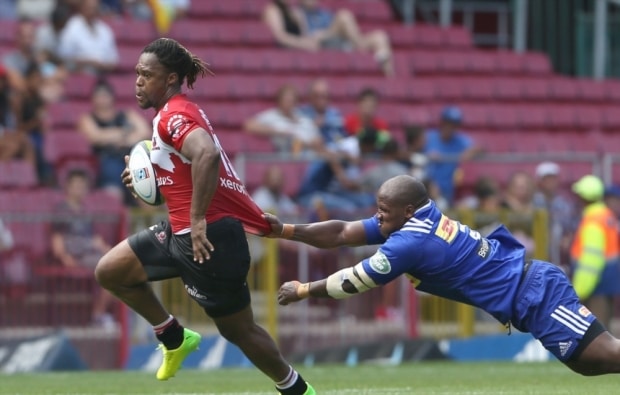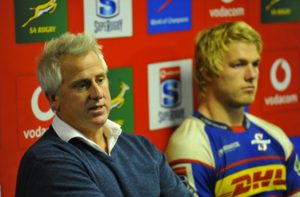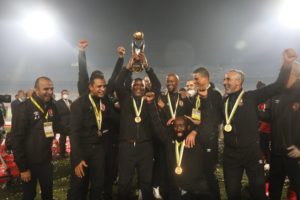South African teams will continue to make up the numbers in the Super Rugby tournament unless they invest more time and effort into their defence, writes JON CARDINELLI.
There were some encouraging moments in the pre-season fixture between the Stormers and Lions at Newlands this past Saturday: SP Marais getting his hands through the tackle to set up Dan du Plessis for a well-worked try; Chris van Zyl crossing the line after several of his team-mates had offloaded in the tackle to keep the movement alive; Elton Jantjies chip-kicking over the opposition defence and Rohan Janse van Rensburg racing through to grab the ball on the bounce.
It was good to see such attacking intent and innovation by two South African teams; teams that won their respective conferences in 2016 and will be favourites to retain said titles in 2017. Yet, one has to wonder if the attacking ambition of the Stormers and Lions has compromised the development of areas of the game which usually separate the conference winners from the genuine Super Rugby trophy contenders.
One also has to wonder what impact this will have on the battling Boks down the line.
Some will celebrate the fact that the Stormers scored nine tries and that the Lions scored six at Newlands on Saturday. Others might point out that the Lions conceded 57 points and that the Stormers leaked as many as 40. By professional standards, it was a shocking defensive effort by both parties.
Lions coach Johan Ackermann lamented the defensive performance after the game. He acknowledged that it was a pre-season hit-out and thus a good indicator of what the team needed to work on in the lead-up to their first Super Rugby game in two weeks’ time. At the same time, he was not about to make excuses.
The Lions conceded 57 points and nine tries. It may have been a friendly, but a number of first-choice players started for the Johannesburg-based franchise. Those numbers suggest the Lions defence is not in a good state.
Perhaps Ackermann was aware of the significance of the numbers 57 and nine in a South African context. Indeed, the Springboks lost 57-15 to the All Blacks in Durban last year – a record loss on South African soil. The Boks conceded nine tries on what coach Allister Coetzee himself described as a dark day for rugby in this country.
The Stormers are recognised as one of the better defensive sides in South Africa and indeed in the Super Rugby competition. Yet, they lost 60-21 to the Chiefs in the 2016 quarter-final at Newlands.
The Stormers conceded eight tries on that occasion. This past weekend marked their first match at Newlands since the humiliating loss to the Chiefs, and while they beat the Lions 57-40 and scored nine tries, they conceded six at the other end of the park.
2016 was a horrific year for South African rugby, both in the Super Rugby tournament and on the Test stage. After five of the six franchises failed to qualify for the semi-finals and the Lions bombed in the final, the Boks went on to record eight losses in 12 Tests.
Many people lamented the Boks’ attacking limitations towards the end of the season, but the most concerning aspect of the team’s decline was their poor defence and kicking game. On average, the national side conceded 27 points and three tries per game.
More is expected of the Boks and all of the South African Super Rugby franchises in 2017. A national coaching indaba was held in October last year. A national conditioning indaba followed. Surely the clever people have recognised what demands improvement ahead of the 2017 season and what is needed to lift South African rugby out of this rut.
It’s frightening to think that a 15-try performance at Newlands on Saturday – the nine scored by the Stormers and the six by the Lions – might be considered by some as a sign of progress. In 2016, the New Zealand sides – the Hurricanes in Super Rugby and the All Blacks on the Test stage – proved that a balanced approach is needed for success. In the past two rounds of the Six Nations, England have struck the best balance between attack and defence and sit at the top of the tournament table.
There will be no points for effort and intent in the coming months. Nobody will care if the South African teams are showing attacking intent in a losing effort. It won’t signify progress, for rugby in the professional era is not just about scoring tries but ensuring that the opposition remain honest.
The Lions certainly know their way to the tryline and won a lot of fans in South Africa and abroad with their attacking performances in 2016. Yet, more will be expected of Ackermann’s charges this season. The progress of the Lions will be measured by how they defend as much as how they attack. If they make the same mistake of placing too much emphasis on the former, they will not progress.
The same is true of the Boks. More should be made of how South Africa failed to play in the right areas last year; how they failed to dominate on defence, and of course how they failed to go the distance with the better teams. As crack sides like the All Blacks and England have shown, a superior defence and kicking game is needed to score more tries and ultimately more wins.
Any other formula is just a recipe for empty entertainment and certainly not geared towards winning trophies that matter.
Photo: Carl Fourie/Gallo Images





